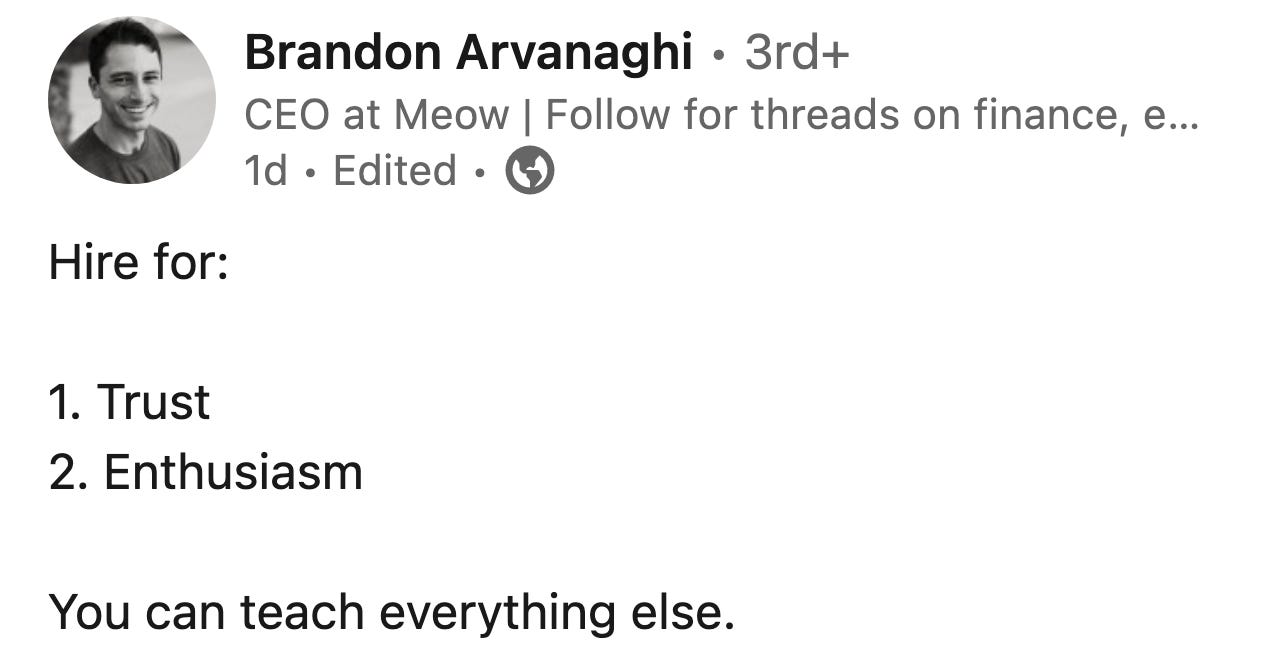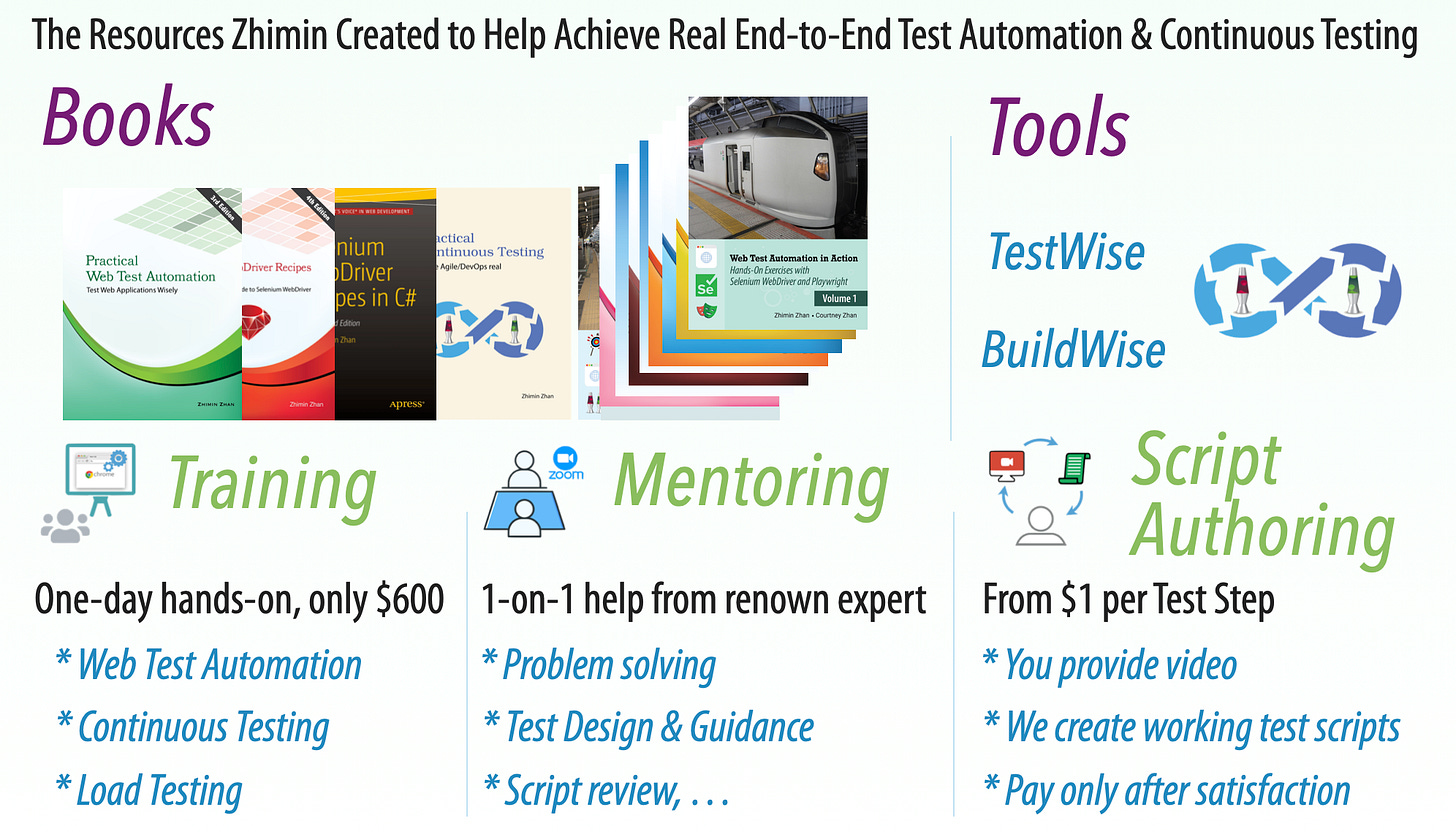Practical Advice for Hiring a Junior Test Automation Engineer. Part 1: The Facts
A cost-saving and sure way
In this “Practical Advice for Hiring a Junior Test Automation Engineer” series:
A junior software professional usually means 0–3 years of work experience (mid-level, 3–5 years) in the software industry.
My general (practical reasons will be shown later) advice is: don’t focus on technical, instead, focus on personal attributes.
1. Honest
2. Passionate
Then, Get a real test automation coach to train them.
this view is not unique, here is one similar.

Some might argue, “This seems like a chicken soup, always correct, but not practical”. Hold on, I will explain the criteria that are specific for junior test automation engineers.
Three Facts about Test Automation
In my view, end-to-end test automation is a unique field within the software industry. My advice on hiring for junior roles comes from two key facts (see below), supported by more than a decade of work and observation.
FACT 1: Universities don’t teach test automation, and few companies provide training
My working career started at universities (two), and I knew IT education quite well. My daughter graduated last year and is still studying for an honour degree part-time, so my knowledge of IT education is not outdated.
As far as I am aware, there is currently no university that provides a comprehensive course specifically focused on End-to-End Test Automation. It is ironic that in many software teams, the number of testers often surpasses the number of programmers.
Some might argue, “That’s because there is not much to teach or research for test automation and CT.” Wrong, check out the “What Does it Take to Become a Real E2E Test Automation Engineer?” and “My Innovative Solution to Test Automation and Continuous Testing” series.
I might be slightly off-track here. Anyway, I think most will agree that universities don’t teach test automation, which is knowledge in need.
FACT 2: Few companies provide training on Automated Testing
From my 12 years of test consulting, a frequent complaint I’ve heard is that software testers rarely receive training in test automation at work. Ironically, it’s usually the testers (and software developers) themselves who request such training, yet companies often ignore these requests.
To be fair, many so-called test automation trainings are of poor quality. Most instructors themselves lack real knowledge, unable to develop even a dozen meaningful tests, let alone maintain them—maintenance being far more challenging. For more, check out “Why Are Most E2E Test Automation Training Not Effective?” series.
Therefore, it is not practical to assume a junior candidate (for a testing role) to possess a useful level of knowledge in test automation. (I will explain more later)
FACT 3: Few software professionals witnessed a single successful test automation
Have you ever worked on a software project that achieves the following?
(nearly) every user story is covered by an automated end-to-end test script, i.e. ‘Done, Done’ in Agile.
all automated tests are run frequently (daily), and the team is confident the tests are valid amid frequent changes to the app.
or daily production releases (required by real agile) enabled by comprehensive automated end-to-end (via UI) regression testing.
If readers are honest, I expect the answers are all “NO”. Here, I show some quotes from the experts.
1. Alan Page, the first author of “How We Test Software at Microsoft” book
“For 95% of all software applications, automating the GUI is a waste of time. For the record, I typed 99% above first, then chickened out. I may change my mind again.” — Alan Page’s Blog (2008)
“95% of the time, 95% of test engineers will write bad GUI automation just because it’s a very difficult thing to do correctly”.
- this interview from Microsoft Test Guru Alan Page (2015)
2. Gerald Weinberg, a software legend (of an early generation)
“Testing is harder than developing. If you want to have good testing you need to put your best people in testing.” - Gerald Weinberg, in a podcast (2018)
3. Robert C. Martin, co-author of the Agile Manifesto:
“Automated testing through the GUI is intuitive, seductive, and almost always wrong!” - his blog (in 2009)
Real test automation engineers are so rare that even LinkedIn Cofounder needs to lure one.

Please note the word “lure”, not “hire”.
Some might wonder, “OK, even LinkedIn is so hard to find one, why do our company bother?” Think differently. Let me ask you a question, “Can most parents teach kids Piano or Tennis?” Of course not. You will get piano lessons or Tennis Coaching sessions.
If IT executives dismiss the idea of hiring an expert exclusively for their company, they may find that accessing test automation experts is surprisingly affordable.
Related reading:



